


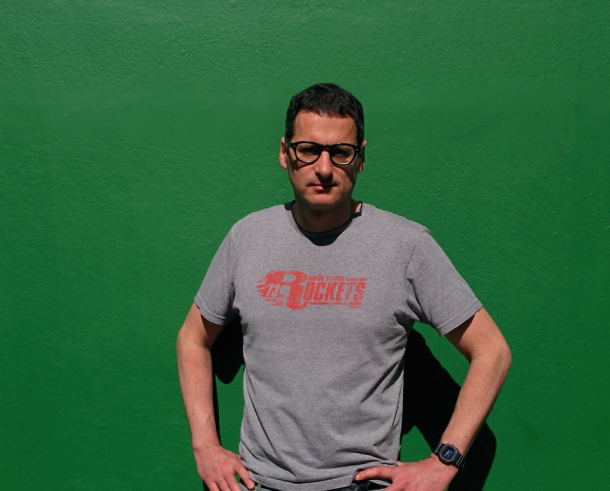
From Bossa Nova pioneers to Disco 2.0 newcomers, from Jazz Funk legends to cult soundtracks, they have released in just over a year several releases drawn from the large spectrum of their musical tastes. It’s time for them to explain their choice and go back to their own roots…
When did you start digging records?
Olivier: When I was a kid, they were selling vinyls at my local supermarket in the surburb of Paris, and they had turntables so you could listen to them, so I started buying 7” and 12” EPs and then LPs. It was mainly pop stuff from that time: A-ha, Dire Straits, U2. At around 10-11 year old, I also went deep into metal with Iron Maiden, Metallica, etc. I also bought records by groups from the French alternative scene like Les Bérurier Noir. I also had a lot of tapes, bought or duplicated from the local library – I still have these. My tape desk is still working and I’m even buying new cassette-only music, now that this format is hip again. Then by my mid-teenage years I switched all in one go to jazz (with Art Blakey), hiphop (with De La Soul, Ice Cube & Public Enemy) and soul/funk (with James Brown). I was influenced by the emergence of hiphop in my neighborhood and thanks to my city library and also to Radio Nova which was a key radio for me at the time, I had access to music. I discovered Paris’ indie records shops (Tikaret, LTD, Crocodisc, etc.) and I never really stopped buying records. By the end of the 90s I added electronic music on top and this mix pretty much what I’m still listening to.
Matt: I started buying records around 10-11 years old. I’d buy mostly 7”. One of the earliest one I remember buying was The Buggles’ Radio Killed the Video Star at my local supermarket. That was probably around 1979. Then I bought the early 80s music that was big at the time: Culture Club, Michael Jackson, Wham. I remember having a shock when I first heard “The Message” by Grandmaster Flash. I also remember buying the 7” of Malcolm McLaren, “Buffalo Gals” around that time. But that was it in terms of new releases. I didn’t like the 80s sound so I bought a lot of 60s, 70s music like Earth Wind and Fire, Marvin Gaye, Stevie Wonder, Pink Floyd. I was constantly digging deeper. Also my best friend was very advanced in his music taste so he guided me a lot. He’d listen to stuff like Steely Dan, Art Blakey and Miles Davis at 13 years old so I got into Jazz at that early age!. We were also Pat Metheny groupies. We had our ECM phase and then with Acid Jazz came in and I went into Rare Grooves and JBs. Another big shock around that time was Gil Scott Heron whom I discovered in 91 thanks to a Super Disco Brake compilation I’d bought. I was lucky to see him live in 92 and that was fantastic.
What LPs did you buy at first? Do you still listen to them?
Olivier: I think it was U2’s “Rattle And Hum” and Dire Straits’ compilation “Money For Nothing”, both in 1988. I discovered the songs “Helter Skelter” and “All Along The Watchtower” on “Rattle And Hum”, and I was very surprised when I discovered the original versions. All the more for “All Along The Watchtower”, because before discovering the Dylan song, I first thought it was actually by Jimi Hendrix! For Dire Straits, it was the beginning of a new addiction that lasted a few years and I bought all of their tapes. I don’t listen to them anymore and by the time my musical tastes evolved, I came to hate them, as one usually does with their teenage tastes! But I still have them. I have some kind of affection for them.
Matt: My father was into Rock’n’roll and Rhythm & Blues so I remember a Chubby Checker album as one of the earliest LP I bought. The first second-hand album I bought was Barry White’s Rhapsody in White album in the mid 80s. That’s when the series Magnum PI was popular and the opening music of the series which was inspired by “Love’s Theme”. My first LPs are at my parents so I don’t get to play them but I’d like to take them back one day
Do you have a particular style or favourite period?
Olivier: I have a strong Black Music basis, ranging from hiphop to jazz, funk and soul, to which you can add a lot of electronic music. Then I like some leftfield stuff revolving around punk, experimental, ambient drone…
Matt: I listen to a lot of different styles but I would say it tends to be mostly Black Music, whether it’s Funk, Soul, Jazz, Hip Hop, Afrobeat. For the last five years I’ve been mainly listening to Jamaican music: Ska, Rock Steady, Dub. and also to a lot of Philly Soul and Disco. I like to think in terms of city and/or era. For instance what were people listen to in 1968 in LA or in 1978 in Berlin or New York without necessary put barriers between genres. I try to recreate the mix of pop, jazz, disco, rock that was going on at the time.
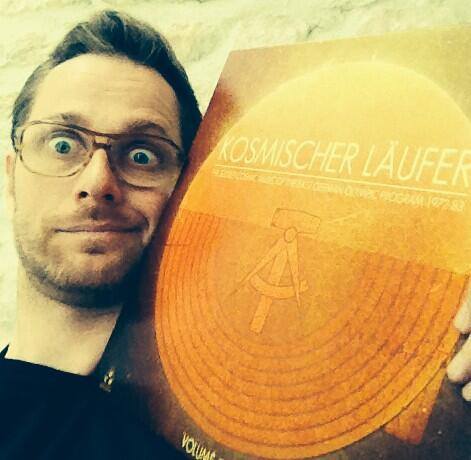
Comme ça…
Are you still digging’, buying vinyl, visiting record shops?
Olivier: A lot! In Paris and everywhere I travel to. Certainly too much, budget-wise, space-wise… I’m actually re-organizing my vinyls and the question of ‘where does it all lead’ comes to mind. So I try to focus on my core tastes and be selective and straight to the point. Because it certainly won’t stop. In terms of what I buy, I’ve always bought new releases, I’m not really a digger of vintage music with original pressings. I prefer to buy what will be considered gems in 20 years! That’s what I did for 90s hiphop: I bought all these records when they first came out. Now I do the same with electronic music. And I also fill the gaps in my soul and disco collection.
Matt: I buy records on a weekly basis. I used to buy a lot of LPs in the 90s and 00s, mainly Jazz, Soul and Funk. Now I tend to buy more CDs than LPs so I don’t go for the very obscure expensive stuff. More like high quality reissues or classic albums I don’t have. Unlike Olivier I never buy new music. I always wait five to ten years if not more to see an album will stand the test of time. Many albums don’t survive the initial hype very long.
What was your first release on WeWantSounds?
Matt: It was a great compilation of French music from the Nouvelle Vague. We’re big film buffs and there is some incredible music made at the time with composers like Michel Legrand or Georges Delerue. That precise moment when French realized there was something more exciting than realist chanson. Same with Brigitte Bardot, France suddenly woke up and realized there was something more sexy than Raimu or Danielle Darrieux.
Why did you choose this name Wewantsounds: is it a statement?
Matt: We wanted something simple, catchy and straight to the point but without any indication of a music genre or specific era. We thought that Wewantsounds was fun and catchy. We imagine all these zombie-like music lovers cropping out after dark all starving and chanting “Wewantsounds”!
What could be your editorial/artistic direction?
Matt: We focus on the music we love trying to add interesting pop culture angles in the mix. We try to bring high quality music in an accessible way. We’re always puzzled to see that many people outside of the hardcore music circles tend to listen to the same thing because they don’t have all the keys to access the more interesting artists. There are a lot of “if you like this, you‘ll love that” out there but it tends to be very commercial.
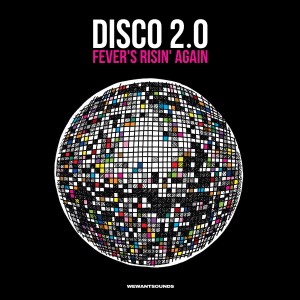
Monika
Secret In The Dark (The Juan MacLean Edit)
What could be the label’s leitmotiv?
Matt: Listen to this cool music, you may not have heard about but you will love it
How do you decide on the choice of reissues?
Matt: There are no rules. We get excited by an idea and we just dig. Most of the time it doesn’t lead to anything: Either we discover it’s been done already or the rights are locked away or there is no real potential but sometimes we hit gold. In terms of concept, it varies. Sometimes it can be led by an artist, sometimes we want to chronicles a label, other times an era or style of Music. We tend to make the decisions organically as we go. We listen to a lot of music so we ping pong a lot of ideas back and forth: do you know this artist? Have you heard this track? What about reissuing that album? We should do a compilation around so and so genre etc.
And what about new artists?
Matt: We both ran labels in the past doing artist development. That’s actually how we met working on Palestinian hip hop group DAM ten years ago. Unlike reissues, artist development requires a lot more muscle and efforts as you deal with the artist, the manager, the touring agent etc. It’s a long chain and things can get more complex. Also you need to be able to sign the right artist who’s got enough of a fan base but the bigger they are the bigger the advance will be. Add to that other costs like tour support, marketing and promotion and the bill will be huge before you start marking a profit. It’s a gamble. With reissue, you won’t probably hit gold but it’s safer and the entry ticket is cheaper. Saying that, we’ll probably try, once we’ve grown to a size that allows a bit of risk taking.
Olivier you have made the selection for your DISCO 2.0 set. What is your role in the label? Is it dedicated to the more contemporary sounds?
Olivier: Thanks to my various jobs in the music industry – running a label, free-lancing as a music PR, working at Radio France and now writing as a journalist, I’ve always been deeply immersed in the music scene: getting new releases, checking out bands, going out to concert venues & clubs. So my aim is to be a curator scanning through the richness of these new scenes, French or international and creaming the best. There are so many incredible young bands and new trends that are bubbling under that deserve to reach a wider audience. We want to go beyond reissues and bring music to people purely on the basis of high quality, whatever the era it comes from.
From Bossa Nova, via Nouvelle Vague …. You have released thematic reissues like Bossa Nova or Sunday Mixtape: why this choice? Are there any others to come?
Matt: We’ve been all submerged by tons of music since the rise of Internet. When your work have something to do with music, your friends and family always ask for advice on some fresh or just good music, because everybody is lost in the flow. So we try to address this need: bring some nicely packaged music curated by connoisseurs for special occasions like Sunday morning mix. There is a big hype around playlists at the moment and we try to give it our own twist with a very selective yet accessible touch, for our compilations to be timeless trips. As we get more established, we’ll do more. We have projects in the pipeline and you can expect some soon in all kind of different genres, from modern punk to sextapes!
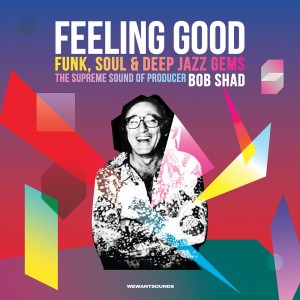
Afrique
House Of The Rising Funk
At the end of 2016, you released “Feeling Good”, a compilation from the Mainstream label, focusing on spiritual jazz, funk and soul. A second set is coming out in June focusing more on the jazz sound. How did you get the access to this catalog?
Matt: I love all that jazz-funk sound from the early 70s and was buying albums from CTI, Flying Dutchman, Groove Merchant, Prestige, Muse. One day in the early 90s I bought two Mainstream LPs in a second hand shop and just loved them. I’d never heard of the label but everything was cool about these: the music was amazing: funky and earthy and you had all these great session photos on the sleeve with this cool producer, Bob Shad, surrounded by young dashiki-dressed black musicians making this outstanding music. In the mid 90s when I started working in the music business I managed to get the contact – from Eddie Piller I think – for Shad’s Daughter Tamara who had inherited the catalog (Shad died in 1985) but I quickly heard that Sony had acquired the back catalogue from her, so I never pursued the idea. Then, last year, I found out it was still owned by Bob Shad’s family, who are none other than comedian producer Judd Apatow and his sister Mia and we got along really well.
Do you also plan to dig the more rock and psychedelic albums of this same label?
Matt: Yes there is some great music on that side as well, although the Big Brother/Janis Joplin master had been sold to Columbia. There are also some great jazz albums from the sixties in the catalogue as Shad ran Time Records as well. There is a beautiful Sonny Clark album for instance. We’re going to reissue this amazing 1967 album by Mauricio Smith called “Bitter Acid”. The title says it all. It’s a fantastic groovy Latin album mixing jazz and boogaloo produced y Joe Cain, very much in the Cotique/Tico vein. Our good mate London Latin DJ John Armstrong will write some new sleevenotes.
You will reissue two albums from the Mainstream catalog: Buddy Terry and Harold Land. Can you tell us more about these?
Matt: Beside the compilations, we thought it would be great to start reissuing original albums. The great thing with Mainstream is that the archives have been carefully preserved and the label still has most of the tapes and session photos. It’s like a goldmine and you can do a lot more. Buddy Terry is an amazing deep jazz album.I knew of Terry from his playing soprano sax in this amazing Art Blakey track called “Song for a Lonely Woman” which is a personal favourite of mine – it’s from the same sessions that produced “A Chant For Bu” famously sampled by A Tribe Called Quest. Anyway Buddy Terry recorded three albums for Mainstream and “Awareness” is the first one, recorded in 1971. It’s an amazing album that ticks all the boxes especially since Strata East co-founder Stanley Cowell is on there and it has a very funky version of his cult standard “Abscretions”. There is also an incredible line up accompanying them: Buster Williams, Cecil Bridgewater, Mikey Roker. It’s both funky and spiritual and you wonder why Terry didn’t get more exposure after these Mainstream albums as they are all amazing.
The Harold Land album is a personal favourite. We’re huge fans of the Harold Land-Bobby Hutcherson Quintet which made incredible music between 1967 and 1971. Land was older than Hutcherson and he was from the first bop generation that came up in the 40s/50s. He’s on the legendary 1955 Max Roach Clifford Brown quintet album which Bob Shad produced by the way. But in the 60s, following the Coltrane revolution, Land found a second life as this extremely inspired modal saxophonist and the association with Bobby Hutcherson, who was at the forefront of the post-bop scene of the late 60s, was a match made in heaven. The created a unique sound which was influenced by Coltrane but it was something else. This Mainstream album from 1971 featuring the rhythm section from Herbie Hancock’s Mwandishi Sextet (Buster Williams and Billy Hart) is their absolute peak. It’s very sophisticated music but very melodic and serene at the same time. We’re going to add a bonus track “Dark Mood” which was briefly released on a Mainstream compilation in 1974 but this is the first time the whole session will be reunited on one CD. And we’ve got some amazing session photos and have even gone back to the original picture to reconstruct the front cover so we’re very excited about it.
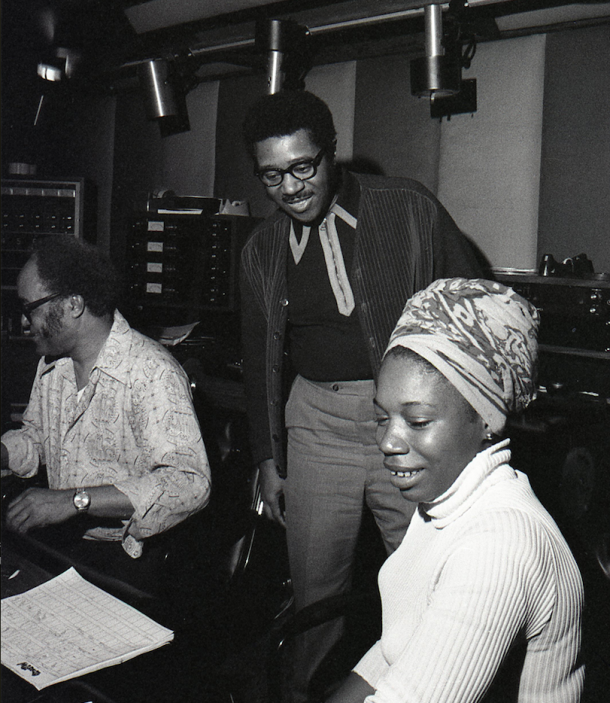
Alice Clark
Never Did I Stop Loving You
Dope classic of the soul, the Alice Clarke album has already been reissued, but rather cheap way. Do you plan to make a beautiful reissue, with why not unreleased tracks?
Matt: It’s a cult classic that should be up there with the Roberta Flack and Aretha Franklin albums. We are thinking about it but as it stands the specific cheap version you are referring to is a bootleg so we’d probably wait before reissuing it.
Nowadays, there are many labels which follow the deluxe model, more quality with lavish packaging at a higher price bracket… At same time, there’s also a more commercial LP market, with majors and mid-price labels releasing their back catalogue. Is it the (re)creation of the old market for the LP?
Matt: Probably but it’s a good sign as it means that the market is expending and diversifying. There is even a third tier for huge boxsets containing books, LPs, Memorabilia. Digital is great but it tends to become like radios especially since streaming is taking over from download. In the future you’ll just tune in to a few playlists to discover stuff and hopefully you’ll go and buy the record if you really like something. There is a cool edge about vinyl, the turntable, the object, the sleeve. It has become a lifestyle accessory. You will soon get turntable buyer’s guide pages in lifestyle mag if not already.
There are more and more reissues of back catalogue LPs, and more and more record labels (major or indie) are now releasing their new artists on LP, or EP. Do you think that the LP reissue market could ever reach saturation point?
Matt: There is a risk and you can never predict what’s going to happen. Trends are fickle. Ten years ago everybody wanted iPods, now it’s turntables. I think it will depend on the younger generation who didn’t grow up with the object. If some of them can be converted to the object then it will keep growing.
Have you received many negative answers from right owners on some of the LPs, artists, unreleased tapes, you were trying to reissue?
Matt: Yes we’ve had all the usual scenarios. The ones who don’t answer at all, those who answer but want a big advance, those who re ok but don’t want to give you the vinyl rights and those who say they are not interested. And you’ve got all the other ones who play the game and give you the tracks without problems. Which are the ones who end up on our releases you could say.
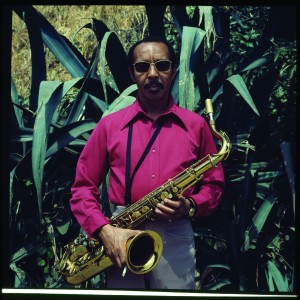
Harold Land
In The Back, In The Corner, In The Dark
What are your next releases?
Matt: On top of the ones we mentioned above, we are preparing a 70s London compilation with DJ Scratchy Sounds who was DJing with the Clash in the late 70s it will be a thrilling sonic mix of punk, garage, dub and R&B with a unique 70s London feel. We are also thrilled to announce the release of an incredible OST by Dave Grusin from “The Friends Of Eddie Coyle” a very cool gangster film directed by Peter Yates (Bullitt). Dave Grusin also composed the music for “The Three Days of the Condor” which is the more famous one but Eddie Coyle recorded two years before is even better. It never came out at the time so it will make its LP debut 45 years after the film was released! We’ve got the master tapes which sound amazing. It plays like a long hypnotic jazzy funky suite.
What is the LP you dream of reissuing?
Matt: “Nightclubbing” by Grace Jones but it’s already been done! It’s the meeting of so many talents: Chris Blackwell’s flair to reinvent Grace Jones as this ice-cold 80s diva, the unique blend of reggae, disco with a zest of punk played by the Compass Point Studio musicians, Grace Jones personality filtered by Jean-Paul Goude’s groundbreaking visuals. It suddenly grabbed everybody out of the 70s. It’s a 4 dimension masterpiece.
Olivier: There’s a French artist called Sig, who wrote the OST of his own indie movies, Louise (Take 2) and Sansa and worked with virtuoso violinist Ivry Gitlis. He’s a modern day hobo, travelling light all over the world and playing with musicians he meets along the way. In 2002, he came back from a long photo trip to India, where he had played and recorded some music. He finished the music in his Montmartre flat, which was completely empty except for a keyboard, a cello and some African percussions. It features famous Swiss trumpeter Erik Truffaz and his musicians. It’s a beautiful dreamy trip that was only released on CD, without a barcode, because Sig didn’t want one. I was the PR for this record, and although it was a tough one to push, it was a tremendous life experience working with Sig. He called everybody “my brother”. I still listen to it on a regular basis each time I need an escape. It doesn’t age. I’d love to bring this treasure to people’s turntables!
Thanks for sharing!! During reading your blog, I came to know about upcoming LPs and qualities of vinyl records in depth. I am also very excited about your new releasing records. I would like to introduce a place where you can find a large collection of old records as well as accessories for vinyl ‘Dutch Vinyl Records’. Visit: https://www.dutchvinyl.com.au